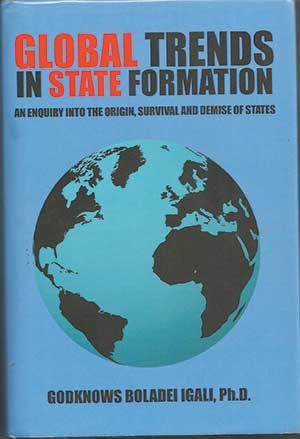Victor Ukaogo here reviews Dr. Godknows Igali’s book, Global Trends in State Formation: An Enquiry into the Origin, Survival and Demise of States. The 417-page book is published by Trafford Publishing (2014)
 Ambassador Godknows Igali’s book, Global Trends in State Formation: An Enquiry into the Origin, Survival and Demise of States, is a must-read for all policy-makers, scholars, administrators, students and foreign policy formulators.
Ambassador Godknows Igali’s book, Global Trends in State Formation: An Enquiry into the Origin, Survival and Demise of States, is a must-read for all policy-makers, scholars, administrators, students and foreign policy formulators.
The subject matter of state formation is complex enough, but the eventual collapse of a given state creates much more complex situation that requires deeper enquiry and greater analysis.
Historians have had the tasking duty of studying the rise and fall of states across all regions of the world, but Igali was preoccupied in this work on the study of the emergence, growth and eventual collapse of states from the perspective and prism of western political philosophy and theology.
The rare display of scholarly erudition by the author came to the fore as he seamlessly straddles between history, sociology, political philosophy and indeed the social sciences, to weave a synergy of the fields in the task of properly analysing how states evolve and disappear from the lens of Western scholarship. The effort of the author here is a symbolic testament to the reality that an African scholar can greatly master western experience and document same effortlessly.
His creation of synergy between humanities, social sciences, theology, Western philosophy and their application in the study of the complexities of nation-state formation requires greater attention by all.
In specific terms, Igali’s book is a historical survey and philosophical enquiry into the origins and formation of various political communities, states, nation-states and societies from the intellectual purview of Western political and religious realm. This book is certainly the author’s reaction to global developments at the twilight of the 20th century when dissimilar levels of development across regions of the world elicited similar outcomes in these regions.
Indeed, while ‘post-modern’ western hemisphere were feeling contented with their advancement in all spheres of life, beside them were immense signs of poverty, crises and conflicts, including political instability. Added to the above are manifest challenges of economic decline, inter-ethnic conflicts, climate change, gross under-development, terrorism and religious extremism. The challenges above deflated the balloon of falsehood associated with the stability of states. For instance, if hitherto stable states could decline and collapse within a short time, it does mean that a philosophical cum historical interrogation is rather compelling and thus an imperative.
The book contains 16 chapters arranged thematically in three parts. Part one with three chapters deals with the ‘Philosophy of State Formation’ while part two with eight chapters broadly focuses on ‘Nation-states and the Challenges of Integration’. The third and final part with five chapters dwells on ‘Anecdotes for the Legacy of Crisis’. Specifically, the first part treats some conceptual issues such as the notion of the ‘state’ and the ‘nation’.
Relying on article 1 of the Montevideo Convention of 1933 on the Rights and Duties of States, the author provides a self-explanatory definition of a state within the context of having a permanent population, defined territory, a government and capacity to enter into relations with other states. He further sheds light on the notion of ‘nation’ to be in contrast with ‘state’, as the former clearly represent a ‘community of people whose members are bonded in one by a sense of communal solidarity, cultural traditions and feeling of common identity’.
On why states exist, the author delved into the ideas of western philosophers, especially in their espousal of the social contract theory. Such philosophers as Immanuel Kant, Descartes, Thomas Hobbes, John Locke, Jean-Jacques Rousseau etc illuminated our understanding of social contract presented from a fresh perspective by the author who weaved an analytical web to explain even briefly how each of these philosophers agreed or differed with each other in their perception of the state, and why it exists.
In a unique application of simple prose, the author connected the ideas of these philosophers, including Socrates and Aristotle, to create an understanding that the state exists for diverse purposes, even as the likes of Adam Smith and Karl Marx in later years insisted that class distinction invariably plays a role in what a state is.
While chapters one to 10 evaluate factors that engender the emergence and growth of states within the global system, chapter 11 onwards examines and provides suggestions that will ensure stability to states in the world. A valuable component of this section is a deep analysis of ‘how states disintegrate’ in contemporary times with particular attention to the old Soviet Union. Several African kingdoms and empires did collapse in the past just as they did in Europe. The Roman and Ottoman empires vanished from the surface of the earth, and very recently, Sudan, Yugoslavia and Czechoslovakia all splintered and went under.
The clash between forces of realism and idealism failed many states and ultimately, for policy-makers and officers of state, the lessons here are unambiguous. But for many that may still feign ignorance, especially in Nigeria, the words of Vladimir Lenin in 1917 and Mikhail Gorbachev in 1990 are valuable pointers.
Lenin, the founder of USSR, opined that “we want voluntary union of nations, a nation which precludes any coercion of the nation by another, a nation founded on complete confidence, on a clear recognition of brotherly unity; on absolute consent…” and in deep contrast to the above, Gorbachev submitted several decades later that “there are historical and religious reasons for the present problems. And of course, we are now having to pay for past crimes committed against the entire nation”.
The enquiry by the author into the emergence, growth and demise of states is most timely, given the insight provided by these erstwhile Russian leaders. While the idealism of Lenin closed the possibility of self-criticism and evaluation, Gorbachev’s acceptance of guilt of the state against the nation more than anything served an essential purpose in the life of the people.
For Nigeria and other African states, what lessons are there in the affirmations of these leaders? Pretending that all is well is an invitation to chaos and the demise of states. George Orwell’s Animal Farm echoed it concerning the USSR, and thus the need for reform. Nigeria is not an exception, but Gorbachev clearly identified the ‘historical and religious reasons’ that promoted the demise of USSR.
The author here is a preacher, if not a prophet, but the reality of the survivability of states must not ignore the contradictions inherent in the Russian example. For us in Nigeria, given the unfolding dilemma of believed historical incompatibility, raging insurgency, religious intolerance and adverse predictions by Western powers, the lessons from this scholarly contribution cannot be over-emphasised. The clock may be ticking very fast, but as a nation of great people, Nigeria must find a way not to be included in the list of states that evolved, grew but slumped to the vagaries of historical and religious contradictions.
This is the strength of this work and may indeed count as the most powerful message contained in this volume by Igali.
• Professor Ukaogo is of the Department of History and Diplomatic Studies, Federal University of Wukari, Taraba State.














